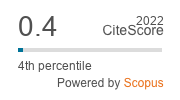Effect of sowing dates and cultivars on incidence of the exotic army worm Spodoptera frugiperda (J.E. Smith) of maize (Zea mays L.)
DOI:
https://doi.org/10.33307/entomon.v48i3.944Abstract
The Effect of sowing dates and cultivars on the incidence of fall army worm Spodoptera frugiperda (J.E. Smith) and yield attributes of maize (Zea mays L.) was carried out with five cultivars namely, Zarsi (local), Sipho (local), Ronimi (local), Khoi (local) and HQPM-1 (composite) and three different sowing dates (6th March, 21st March and 5th April). Among the different dates of sowing, 6th March recorded maximum pest incidence, while 5th April recorded the least on maize. The interaction between sowing dates and cultivars showed significant effect on the incidence of army worm at different days after sowing. The maize sown on 21st March, recorded the highest grain yield (4.12 t ha-1). It can be suggested that manipulating the sowing date and growing of tolerant variety of maize such as HQPM1 can be an effective measure to manage exotic army worm infestation. Mid sowing of maize (21st March) and growing of local cultivars such as Sipho observed significantly better yield attributes which will ensure higher economic returns to the farmers.


